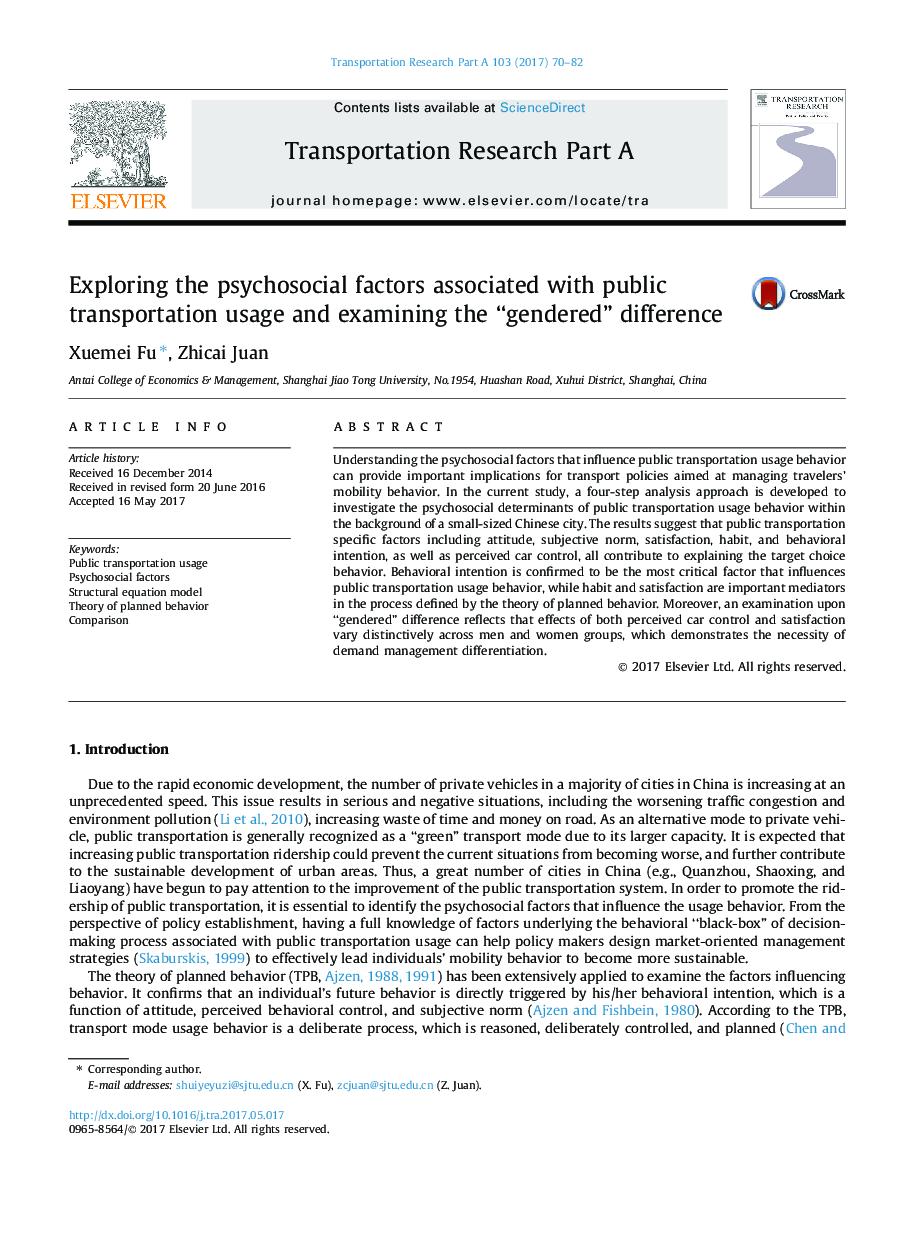| کد مقاله | کد نشریه | سال انتشار | مقاله انگلیسی | نسخه تمام متن |
|---|---|---|---|---|
| 4928907 | 1432197 | 2017 | 13 صفحه PDF | دانلود رایگان |
عنوان انگلیسی مقاله ISI
Exploring the psychosocial factors associated with public transportation usage and examining the “gendered” difference
ترجمه فارسی عنوان
بررسی عوامل روانی اجتماعی مرتبط با استفاده از حمل و نقل عمومی و بررسی جنسیت؟ تفاوت
دانلود مقاله + سفارش ترجمه
دانلود مقاله ISI انگلیسی
رایگان برای ایرانیان
کلمات کلیدی
استفاده از حمل و نقل عمومی، عوامل روانشناختی، مدل معادلات ساختاری، نظریه رفتار برنامه ریزی شده، مقایسه
ترجمه چکیده
شناخت عوامل روان شناختی که بر رفتار استفاده از حمل و نقل عمومی تأثیر می گذارد می تواند پیامدهای مهمی برای سیاست های حمل و نقل برای مدیریت رفتار حرکتی مسافران باشد. در مطالعه حاضر، یک رویکرد تجزیه و تحلیل چهار مرحله ای برای بررسی عوامل روان شناختی رفتار رفتار استفاده از حمل و نقل عمومی در پس زمینه شهر کوچک چین توسعه داده شده است. نتایج نشان می دهد که عوامل خاصی از حمل و نقل عمومی شامل نگرش، هنجار ذهنی، رضایتمندی، عادت و قصد رفتاری، و همچنین کنترل تصور ماشین، به توضیح رفتار انتخابی هدف کمک می کنند. قصد رفتاری تأیید شده است که مهم ترین عامل تاثیر گذار بر رفتار استفاده از حمل و نقل عمومی است، در حالی که عادت و رضایتمندی واسطه های مهم در فرایند تعریف شده توسط نظریه رفتار برنامه ریزی شده است. علاوه بر این، یک معاینه بر روی جنسیت؟ تفاوت نشان می دهد که اثرات کنترل و رضایت هر دو تصور ماشین های مختلف در میان مردان و زنان متفاوت است، که نشان دهنده ضرورت تقسیم مدیریت تقاضا است.
موضوعات مرتبط
مهندسی و علوم پایه
سایر رشته های مهندسی
مهندسی عمران و سازه
چکیده انگلیسی
Understanding the psychosocial factors that influence public transportation usage behavior can provide important implications for transport policies aimed at managing travelers' mobility behavior. In the current study, a four-step analysis approach is developed to investigate the psychosocial determinants of public transportation usage behavior within the background of a small-sized Chinese city. The results suggest that public transportation specific factors including attitude, subjective norm, satisfaction, habit, and behavioral intention, as well as perceived car control, all contribute to explaining the target choice behavior. Behavioral intention is confirmed to be the most critical factor that influences public transportation usage behavior, while habit and satisfaction are important mediators in the process defined by the theory of planned behavior. Moreover, an examination upon “gendered” difference reflects that effects of both perceived car control and satisfaction vary distinctively across men and women groups, which demonstrates the necessity of demand management differentiation.
ناشر
Database: Elsevier - ScienceDirect (ساینس دایرکت)
Journal: Transportation Research Part A: Policy and Practice - Volume 103, September 2017, Pages 70-82
Journal: Transportation Research Part A: Policy and Practice - Volume 103, September 2017, Pages 70-82
نویسندگان
Xuemei Fu, Zhicai Juan,
